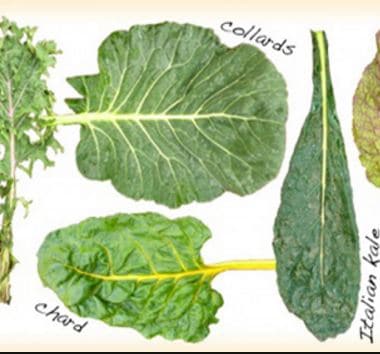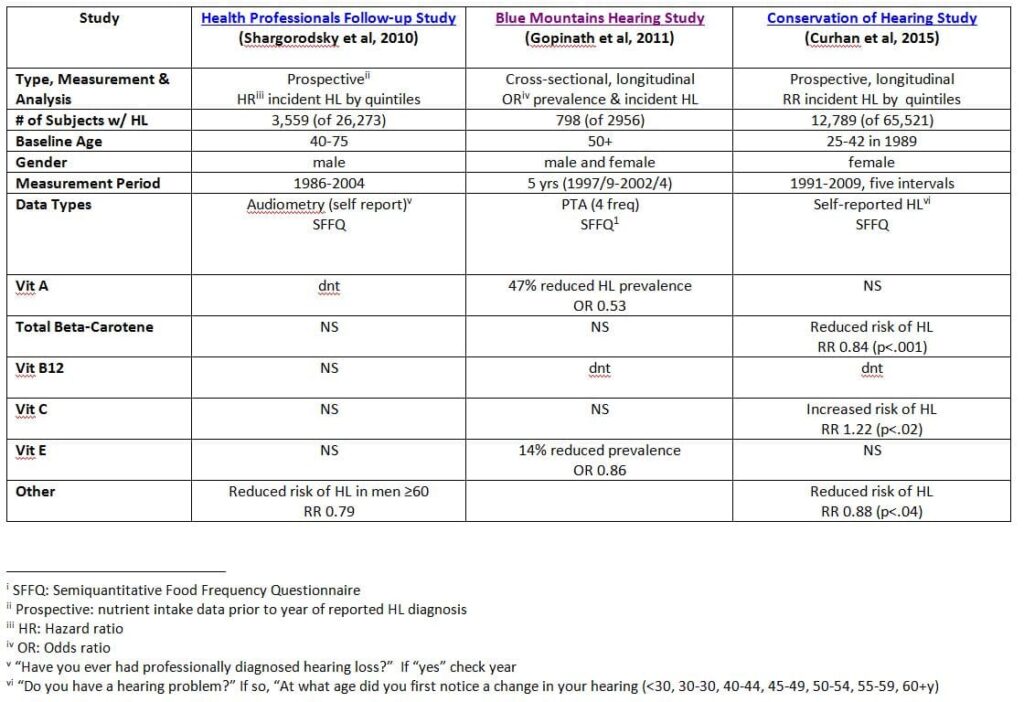Last week’s post initiated a discussion of diet, specifically antioxidants and vitamins, as “… one of the few modifiable risk factors for age-related hearing loss” (Gopinath et al 2011). Today’s post summarizes salient features of several investigations of hearing loss and dietary risk factors which derive their findings from longitudinal epidemiological health studies of different subject groups in different countries:
- United States, adult males: Health Professionals Follow-up Study (Shargorodsky et al, 2010)
- Australia, adult males and females: Blue Mountains Hearing Study (Gopinath et al, 2011)
- United States, adult females: Conservation of Hearing Study (Curhan et al, 2015)
In the aggregate, these studies find that some vitamin antioxidants have some influence on hearing loss, at least in some age or gender groups. The main take home from these large and important studies is that more studies are needed to reach conclusive results regarding dietary effects on prevalence and incidence of hearing loss in adult populations.
Health Professionals Follow-up Study (HPFS)
This study began in 1986 with men aged 40-75 years old. Baseline enrollees were over 51,000 males from dentistry, optometry, osteopathy, pharmacy, podiatry, and veterinary professions. The hearing loss study (Shargorodski et al, 2010) was cross-sectional and prospective, limited to just over 26,000 original subjects who qualified based on a 2004 self-report query of whether there was a “professionally diagnosed hearing loss” from 1986 to 2004. Subsequent data analysis focused on self-reports on food frequency questionnaires administered every two years prior to year of hearing loss diagnosis.
Conclusions were that risk of hearing loss was not reduced by intake of vitamins C, E B12, and beta carotene. Risk was possibly reduced with folate intake, but only in men greater than 60 years of age (see Table 1 below).
Blue Mountains Hearing Study (BMHS)
BMHS comprises a variety of studies (see reference list belo0w) as part of the Blue Mountains Cohort Study, supported by the Australian Government’s National Health and Medical Research Council. Almost 3000 Australians, aged 50+ at baseline, were examined in two time periods spanning 7 years (1997-9 to 2002-4). Intake of different vitamin antioxidants was determined through administration of a food frequency questionnaire.
In the Gopinath et al (2011) study, the dependent variables were prevalence and 5-year incidence of hearing loss, as measured by 4-frequency PTA (.5, 1, 2, 4 kHz) (Gopinath et al, 2009). Analyses controlled for age, sex, smoking, education, occupational noise exposure, family history of hearing loss, history of diagnosed diabetes and stroke.
Conclusions were that that vitamins A and E may help reduce risk of age-related hearing loss (see Table 1 below). Specifically, the risk of moderate to severe hearing loss was reduced by 47% for subjects who ranked in the top 20% of vitamin A intake, compared to those in the lowest intake group. Those with vitamin E intake greater than the group average were statistically less likely to have hearing loss. The reduction in hearing loss was 14% for every standard deviation above the average intake level.
Conservation of Hearing Study (CHEARS)
Over 65,000 US women from the Nurses Health Study II were followed from 1991 to 2009. Dietary information and hearing loss were based on self-report: SFFQ every four years, starting in 1991; HSSQ in 2009 (see Table 1, footnotes v & vi). The study was prospective, analyzing dietary intake data preceding date of reported hearing loss.
Results showed lower risk of hearing loss with higher intakes of beta carotene and folate. There was a higher risk of hearing loss with intake of vitamin C (see Table 1). There was no effect on hearing loss risk from vitamins A or E, or other carotenoids.
Summary of the Studies
Table 1. Summary of 3 Epidemiological studies of dietary intake and adult hearing loss.
Tentative Conclusions
Until more studies are done using comparable measures, it doesn’t seem like a bad idea to try to protect your hearing by favoring intake of vitamins A and E, beta-carotene, and folate while skipping vitamin C supplements.
References and Related Studies
Curhan SG et al. Fish and fatty acid consumption and the risk of hearing loss in women. Am J Clin Nutr. 2014, Nov;100(5): 1371-7.
Curhan SG et al. Carotenoids, vitamin A, vitamin C, vitamin E, and folate and risk of self-reported hearing loss in women. Am J Clin Nutr. 2015 Nov; 102(5): 1167–1175. Published online 2015 Sep 9. doi: 10.3945/ajcn.115.109314 PMCID: PMC4625586
Curhan SG et al. Prospective study of alcohol consumption and self-reported hearing loss in women. Alcohol, 2015, Feb;49(1):71-7.
Gopinath B et al. Prevalence of age-related hearing loss in older adults: Blue Mountains Study. Arch Intern Med. 2009; 169(4): 415-418.
Gopinath B et al. Dietary antioxidant intake is associated with the prevalence but not incidence of age-related hearing loss. J Nutr Health Aging 2011;15:896–900.
Rimm EB etl al. Reproducibility and validity of an expanded self-administered semiquantitative food frequency questionnaire among male health professionals. Am J Epidemiol 1992;135:1114–26, discussion 27–36.
Sindhusake D et al. Validation of self-reported hearing loss. The Blue Mountains Hearing Study. Int J Epidemiol (2001) 30(6): 1371-1378.
Shargorodsky J et al. A prospective study of vitamin intake and the risk of hearing loss in men. Otolaryngol Head Neck Surg. 2010 Feb; 142(2): 231–236. doi: 10.1016/j.otohns.2009.10.049 PMCID: PMC2853884 NIHMSID: NIHMS180764
click here for more CHEARS studies
feature image from The Health Moderator







